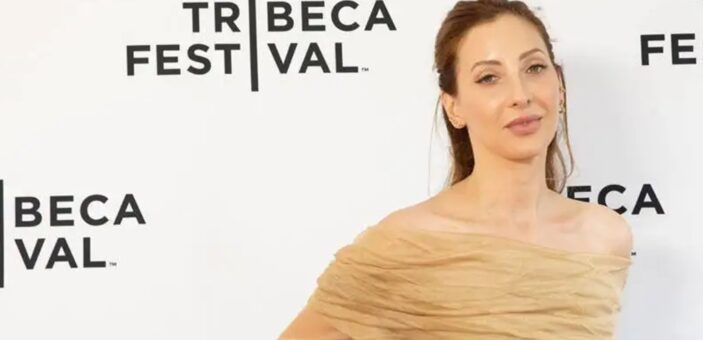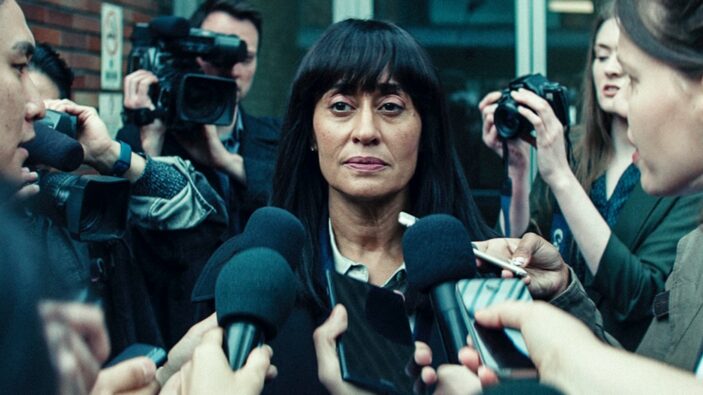
Following its world premiere at the 2023 Tribeca Film Festival, Cold Copy is gearing up for its international roll-out, with the tension-filled dramatic thriller first arriving in North American theatres and On Demand this week.
Marking Roxine Helberg’s feature film directorial debut, Cold Copy tells the story of two driven women pushing the boundaries of journalistic integrity for the sake of delivering a compelling, and ultimately scandalous, exposé. Eager to impress the esteemed-yet-cutthroat news reporter Diane Heger (Tracee Ellis Ross), ambitious journalism student Mia Scott (Bel Powley) desperately competes for her attention. With increasing pressure from Diane to outperform her peers, Mia finds a new angle for her latest story about an unsuspecting subject: precocious teen Igor Nowak (Jacob Tremblay). But her new approach involves manipulating his story – and the truth itself.
To coincide with its release, Peter Gray spoke with Roxine about what inspired her to make the film, her own personal connection to the world of journalism, her ethical compass in telling the truth, and how she came to find the perfect sparring partners in Tracee Ellis Ross and Bel Powley.
Congratulations on the film. Films about journalism always hit differently for me. I like to think I’m a good journalist, an ethical journalist, even though it’s in the film realm, the truth still matters. And it was one of the early lines of the film, and I’m paraphrasing, but it was about a journalist making less money than people that review Kombucha online, or something to that effect. That was a line of truth! When you were looking at this film, were those lines of journalism and entertainment blending something you always considered?
Yeah, absolutely. I wanted to explore our relationship with truth, and that particular form of tension and sensationalism, and I wanted to do it in a heightened way. I think, to me, it’s about examining our system and how this broader cultural attitude breeds a particular type of person and we reward that behaviour. I think we live in a system that doesn’t necessarily reward being truthful in the first place, and instead teaches people to prioritise being quick and interesting and provocative. There is a relationship between journalism and filmmaking. Both involve a series of decisions. Where to start? And how you frame your story and the perspective. You can use lies to examine the truth, and good journalism can use the truth to examine lies.
Relating it to film, I think audiences and critics can tell when a film is true. It’s true to what the writer and the director want to say. You’re both here. Do you have a journalistic background at all? And how did this become a world you wanted to immerse yourself in?
Well, I wanted to be a journalist growing up. I think how this specific story came about was, maybe 10 years ago, I was noticing the pressure to present the perfect version of yourself. Thanks to social media, we had to bend the image of ourselves. Attract more attention. Attract more likes. And what was really interesting to me was that there was a parallel with what was happening in journalism with the rise of clickbait, and those types of self-creating stories. There was basically this attention economy emerging that was bleeding into our culture at large, and it was affecting the way we were communicating and what we were consuming. I really wanted to explore the effect of that psychologically. What it does to us on a personal level. That was the sort of impetus of the story.
What was the research process like?
I watched a lot of those dark-driven news shows where the news itself is sort of filtered through the perspective of the charisma of the presenter. I think there’s something really unnerving about giving the news with a transformative face and mouth in that way, and I wanted to explore that unnerving angle in the character of Diane. (Christiane) Amanpour and (Oriana) Fallaci are incredibly inspiring to me, and I think, in a way, Diane is the darkened version of journalists like them. I think what makes them such great interviewers is the power they’re able to wield over (their subjects). That one-on-one dynamic where they simultaneously put a subject at ease and wrong-foot them and get them to open up, while challenging them. It’s like watching a sparring match.
I see everything that journalism can and should embody. That amazing ability to squeeze truth out of a stone, and to be conscientious with what is found. And what’s so tragic about Diane is that she has that same power but she deliberately misuses it. That’s what’s scary about the type of journalism Diane represents.
As you mentioned with Diane, casting is key with these films, and Tracee Ellis Ross….I know that as a character we shouldn’t like her, but Tracee just has that thing that you want to keep watching her. How did she and Bel Powley come to be your sparring partners in this?
Yeah, I knew this story rested on the duality of these two man characters. Diane and Mia have this gap between their outward presentation and their true selves. Bel, in her work, I think she has this ability to ride the line between being wide-eyed and naïve on one hand, and sharp and considered and intimidating on the other. We need the audience to believe that it could go either way. Either she falls under Diane’s orbit, or she realises she’s on the wrong path. I knew that Bel could pull that off like no one else. And, to your point, Tracee is just charisma embodied. But she also has this incredible emotional depth, and it’s effortless. It’s so perfect for Diane, because you need the audience to be wowed by her and to fall under her spell in the way that Mia does, so when those deeper emotional cracks start to show there’s real impact.

And this is your first feature film? I can only imagine what type of challenges you faced. Was there anything you weren’t expecting? Or anything that proved easier than anticipated?
I mean, we shot this in 20 days. We had to move really, really fast. That speaks to how amazing the cast and crew were, you know? Even without a minute to spare during shooting, everyone came together and really navigated the insanity beautifully. I think I learned…I mean, I learned everything. It was my first feature, but one thing is that filmmaking is about having ideas and committing to them, and being courageous about your vision, but also practical. The real key is specificity.
I think that the narratives and stories that really resonate with people tend to be those that are specific. And, most importantly, the film is an ensemble, and so a big part of your job as a director is having the ability to pick the right collaborators. I was very fortunate that someone like Tracee is so talented, but she’s also a really interesting person in the way that she thinks about life. And the same can be said for my cinematographer, Matteo (Cocco), and my editor, Arndt-Wulf (Peemöller). They’re interesting people. They all have different experiences and backgrounds. So work is coming out of all those people, and as the film progresses you’re working with all of these people and the movie starts to make itself and it’s telling you what it should be. I learned not to be too precious about what was in my head or on the page, because, ultimately, it’s never as invigorating as what happens on the day. It’s learning to be as present as possible on set, for me.
Looking at what’s been put together, you wouldn’t think of it as 20 days. I think that also speaks to your character, as well. You said you wanted to be a journalist growing up, and I always thought I was going to be in film somehow, so at least we’ve covered the bases between the both of us. And one of the main takeaways from this, I feel, is that manipulation of truth and how easy it is, and I hope for people that watch this film that it gives them that extra insight into how everything you read and see isn’t necessarily true.
Well, thank you. You know, I really don’t think this movie presents answers to the problem of manipulation of truth. And it’s not meant to. It’s just meant to show, going back to what you were saying, this idea that manipulation and dishonesty always breeds more of the same, and it has a personal cost and we can all fall prey to it. I think that journalism at its best is the most important, most elevated form of storytelling, because it’s the only one that has information and education as its essential goal. I hope in exploring these different facets in Cold Copy it can inspire aspiring journalists to see the power in what they do.
Cold Copy is now screening simultaneously in limited release in theatres in the United States and available On Demand. Vertical has acquired Australian and New Zealand rights to distribute the film at a later date.
